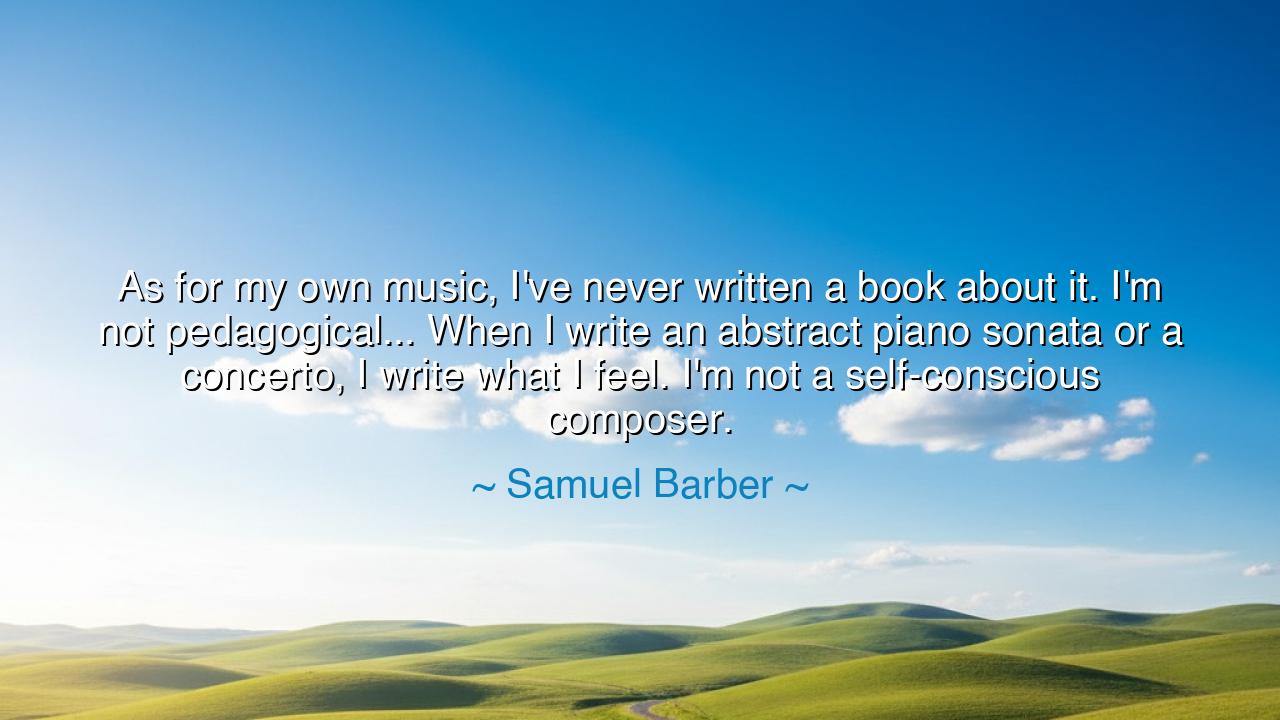
As for my own music, I've never written a book about it. I'm not
As for my own music, I've never written a book about it. I'm not pedagogical... When I write an abstract piano sonata or a concerto, I write what I feel. I'm not a self-conscious composer.






Samuel Barber, the composer whose works carried both sorrow and radiance, once confessed: “As for my own music, I’ve never written a book about it. I’m not pedagogical… When I write an abstract piano sonata or a concerto, I write what I feel. I’m not a self-conscious composer.” In these words lies the humility of a man who refused to trap his art within theories or formulas. He teaches us that true creation is not born of calculation, but of truth unfiltered, of emotions made sound before reason has time to tame them.
The ancients themselves understood this paradox. Plato wrote of divine madness, claiming that the greatest poetry is not born of skill alone but of inspiration from beyond. The Hebrew psalmists did not draft manuals on harmony, but cried out from the depths of their hearts. The rishis of India sang their hymns not as lessons, but as revelations. Barber’s refusal to be pedagogical is his way of affirming this ancient law: art is not primarily instruction, but revelation. It must flow, not be dissected.
Barber himself embodied this truth in his most famous work, the Adagio for Strings. It was not conceived as a lecture in harmony, but as an outpouring of feeling—aching, luminous, transcendent. When it was played after the death of Franklin Roosevelt, and later after the September 11 attacks, people felt not theory but grief, not analysis but catharsis. That single piece revealed more than any textbook could. It was the sound of the human soul exposed, precisely because Barber had written what he felt, not what he theorized.
History bears witness to this same pattern. Consider Franz Schubert, who in his short life composed hundreds of works, yet left behind little in the way of explanation. He lived not to analyze, but to pour melody upon melody straight from the heart. His Unfinished Symphony endures not because it can be perfectly dissected, but because it speaks to the human condition in a way beyond words. The greatest art is often created not by the self-conscious composer, but by the one who dares to let the heart sing freely.
The meaning of Barber’s words is a reminder that the role of the artist is not to be a teacher, but a vessel. When he says he is “not self-conscious,” he rejects the pride that weighs down many creators, who fear how they will be judged. Instead, he embraces the purity of expression, trusting that what is honest will carry its own power. This is not carelessness—it is courage. For to create without calculation is to risk vulnerability, to offer the raw truth of one’s heart to the world.
The lesson for us is clear: in whatever craft or calling we pursue, we must dare to create from authenticity, not merely from theory. Knowledge is useful, but it must never smother the spirit. If we overthink, we lose the freshness of feeling; if we self-consciously shape every gesture to impress, we rob our work of soul. The greatest power lies in sincerity—whether in art, speech, or action. Let us live not as performers before the crowd, but as honest beings who give what we truly feel.
Therefore, let each person cultivate honesty in creation. When you write, speak, or work, ask yourself not only, “Is this correct?” but also, “Is this true to my heart?” Dare to put forth what you feel, for sincerity resonates more deeply than calculation. And if others demand explanations, remember that not all truth can be taught—some must simply be experienced.
Thus Samuel Barber’s words endure: “I write what I feel. I’m not a self-conscious composer.” They remind us that art—and indeed life—is not about appearing wise, but about living authentically. When we shed the chains of self-consciousness, when we cease to calculate and simply create, we give the world not a mask, but a gift: the raw echo of the human soul, woven into sound, into word, into deed.






AAdministratorAdministrator
Welcome, honored guests. Please leave a comment, we will respond soon